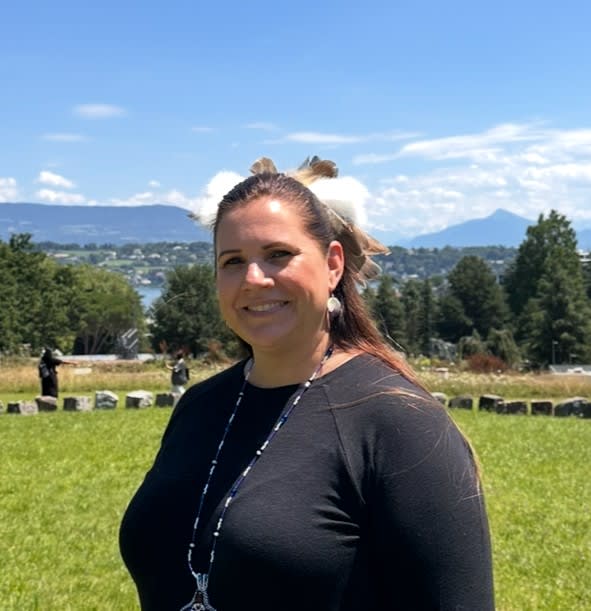We are Niagara Health is a series of stories that celebrates the incredible people working and volunteering in our organization and how they make a difference in the lives of patients and coworkers every day.
For Krystal Brant, stepping into the role of Indigenous Relations Specialist is deeply personal.
It’s about honouring her aunt’s memory, uplifting her community and ensuring Indigenous patients no longer feel invisible in the places meant to heal them.
“As a Mohawk woman and mother, I carry a deep responsibility to protect and uplift future generations,” says Brant, who joined Niagara Health earlier this year, with a focus on staff development. “This role felt like a natural extension of both my education and lived experience.”
Brant, a band member of the Mohawks of the Bay of Quinte with maternal ties to Six Nations of the Grand River, grew up in Niagara. Her path to healthcare began in education, where she spent more than 15 years advocating for culturally grounded learning. She later pursued a Master of Social Work in Indigenous Trauma and Resiliency, completing her practicum at Niagara Health’s New Port Centre in Port Colborne, where she supported individuals in recovery.
Her new role is focused on staff development — helping her colleagues to deepen their understanding of Indigenous histories, traumas and healing practices to create culturally safe care environments.

Krystal Brant brings her lived experience, community roots and a deep commitment to Reconciliation to her role as Indigenous Relations Specialist, Staff Development at Niagara Health.
“Professionally, it has allowed me to bring together my background in education with my passion for systems change,” she says. “Personally, it’s about honouring my aunt, who I cared for during her final years of life, and every Indigenous person who has ever felt unsafe or unseen in the healthcare system. I’m here to challenge that — with heart, with humour and with a deep sense of purpose.”
Brant defines cultural safety as a standard, not a suggestion — where Indigenous patients don’t have to emotionally prepare before walking through hospital doors.
“It goes beyond inclusion or diversity checkboxes. It’s about creating environments where Indigenous people can access care without fear of being dismissed, misunderstood or retraumatized,” she says.
Some of her early work includes leading staff training, engaging in team consultations and hosting a recent Lunch and Learn on the meaning and intent behind Land Acknowledgements.
She emphasizes that Reconciliation is an active, ongoing process — not a symbolic gesture.
“Reconciliation isn’t passive, it’s active and personal,” says Brant. “Cultural safety and trauma-informed care are not just theoretical. They’re felt in every patient interaction, policy decision and every missed opportunity.”
Growth doesn’t happen in comfort zones. We can’t transform systems if we’re not willing to challenge our own practices.
A key part of her message is that growth requires discomfort — and that meaningful change comes from facing hard truths.
“Growth doesn’t happen in comfort zones. We can’t transform systems if we’re not willing to challenge our own practices,” she says.
Brant also offers practical advice to hospital staff: pronounce names correctly, ask before assuming and be open to ways of healing that may not fit into clinical models.
“Wholistic care means seeing the full human being in front of you — their body, mind, spirit, family and culture,” she says. “Respect goes a long way. It’s a universal teaching for how we treat all patients.”
Although new in her role, Brant says working alongside the Indigenous Health Services and Reconciliation team has already been incredibly rewarding.
“Their dedication, heart and advocacy are felt in everything they do,” she says.
Looking ahead, her vision is both hopeful and transformative.
“My hope is that my children’s generation won’t need an Indigenous Health Services and Reconciliation team to advocate for them to receive equitable care, because that care will already be embedded into the system,” she says.
“Reconciliation in healthcare means building a system where Indigenous people are not just surviving it — but shaping it, thriving within it and trusting it.”

